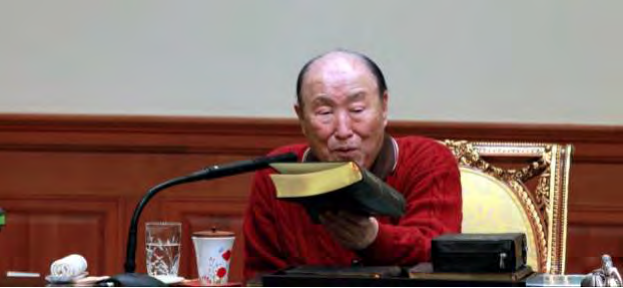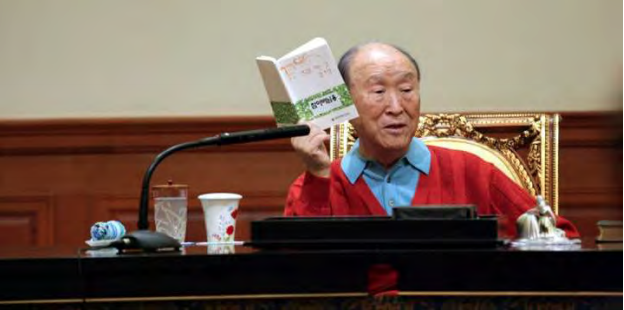Sun Myung Moon
October 17, 2014
Excerpt from "As a Peace-Loving Global Citizen"
Compiled by Taekon Lee
The twentieth century was a time of tremendous change. More happened in that hundred-year period than during the past two thousand years. It was the century when there were two world wars and when communism rose to great strength and then disappeared. It was also the century when humanity turned its back on God and buried itself in material things. What about the twenty-first century, then? Some say that advances in science have proven that many religious beliefs are mere superstition and irrelevant to the modern world. I contend, however, that the role of religion will always be relevant as long as the spiritual aspect of human beings remains a reality and a world of peace has not been established.
What is the purpose of religion? It is to bring about God’s ideal world. The reason religions evangelize is because they desire to increase the number of citizens under God’s sovereignty. If everyone were to live under God’s sovereignty, we would have a world of peace where there would be no war or division. The ultimate destination of the path followed by religions should be peace.
God created this world out of a desire for love and peace. If we create division by insisting that our own religion is the only path to salvation, we go against God’s desire. God wants everyone in the world to work hard for peace, reconciliation, and coexistence. If people say that coming to church creates division in their family, then I do not hesitate to tell them that they should put their family first. Religion is only a means to bring about God’s perfect world; it is not an end in itself.
Humankind’s destiny is to bring together all the points of view that are now divided against each other. The philosophy that will lead humanity in the future must be able to bring together all religions and philosophies. The days have ended when one country stands at the forefront and leads humanity. The era of nationalism has also ended.
If we continue the era of people congregating together only by religion or race, then humanity cannot avoid a repetition of war. The age of peace absolutely cannot come unless we transcend cultural customs and traditions. No ideology, philosophy, or religion that has influenced humanity in the past is capable of bringing about the peace and unification that is needed for the future. We need a new ideology and philosophy that goes beyond Buddhism, Christianity, and Islam. For my entire life, I have called on people until my voice is hoarse to transcend their religious factions and even their religions.
There are more than two hundred countries in the world, and each has its own national borders. A border separates one country from another, but countries separated by borders cannot endure eternally. Only religion can overcome national borders. However, religions that should be bringing people together have instead divided themselves into many factions that are busy fighting each other. They have fallen into a selfish thought process that puts their religion or faction first. They are oblivious to the fact that the world has changed and a new era of selflessness has dawned.
It will not be easy to tear down the religious walls that have stood for thousands of years, but these walls must come down if we are to advance into a world of peace. Religions and their factions must stop their meaningless fighting, find a middle ground for their differing opinions, and develop concrete ways to advance the world of peace.
For humanity to be happy in the future, material affluence alone will not be sufficient. It is urgent that the struggles of modern ideologies, cultures, and races be overcome through interreligious understanding and spiritual harmony.
All my life I have made the following appeals to the wide variety of religious people I have met around the world: First, respect the traditions of other religions and do everything you can to prevent conflict and discord among religions. Second, all religious communities should cooperate with each other to serve the world. Third, the leaders of all religions should work together to develop a structure that will let us accomplish our mutual mission of establishing world peace.
The right eye is there for the left eye, and the left for the sake of the right. The two eyes together exist for the sake of the whole body. The same can be said for every other part of the body. Nothing exists for its own sake. Religion, too, does not exist for its own sake but for the sake of love and peace. Once world peace is accomplished, there will be no further need for religion. The ultimate purpose of religion is to bring about the reality of a human community filled with love and peace. This is God’s Will.
It is not easy to create an environment where people’s hearts are filled with a craving for peace. Continuous education is the only solution. This is the reason that I devote myself to projects in the field of education. We founded the Sunhwa Arts School even before our church had developed enough to stand on its own.
A school is a holy place where truth is taught. What are the most important truths that should be taught in school? The first is to know God and recognize His existence in the world around us. The second is to know the fundamental origin of human beings, our responsibilities, and how to fulfill our responsibilities for the sake of the world. The third is to realize the purpose for the existence of human beings and to then create an ideal world for that existence. These things can be understood only after they have been taught with sincerity and dedication over a long period.
Education today is focused on creating a winner-take-all society where those who finish first are rewarded with a monopoly on happiness. This is not the right way to educate children. Education must be a means for creating a world where all humanity can live well together. The philosophies and methods of education that have dominated us until now must be changed to ones that let us advance toward humanity’s common goals. If the United States were to educate only for the sake of the United States, and Britain only for sake of Britain, then humanity’s future would be dark.
Educators must not teach how to live selfishly but instead impart the wisdom needed to resolve the myriad social problems we face today. The role of religious scholars is even more important. Religious scholars do not need to be teaching complex theories and the superiority of their own religions. Instead, they need to give their students the wisdom to love humanity and build a world of peace. They need to teach the principle of selflessness. We cannot expect a future of happiness for humanity if scholars do not take the lead in teaching our descendants the principles of peace. Humanity is one brotherhood and sisterhood, and the world is one family.
The most important wisdom needed by humankind comes from knowing God’s heart and His ideal. For this reason, the role of religion continues to be important, especially in the twenty-first century, when science and technology seem to be replacing the role of religion in understanding how the universe operates. Religions around the world must understand the destination of the human journey and immediately cease all major and minor struggles. They should not be fighting for the purpose of protecting their own honor. Religions must pool their wisdom and combine their energies and work diligently to build the ideal world. They must forget the past struggles filled with hatred and work out peaceful solutions. No matter how much we have done for world peace, there is always more to be done. Religious people, whose mission is to lead humanity into the ideal world, must not forget for a moment that truly their only mission is to be apostles of peace.























